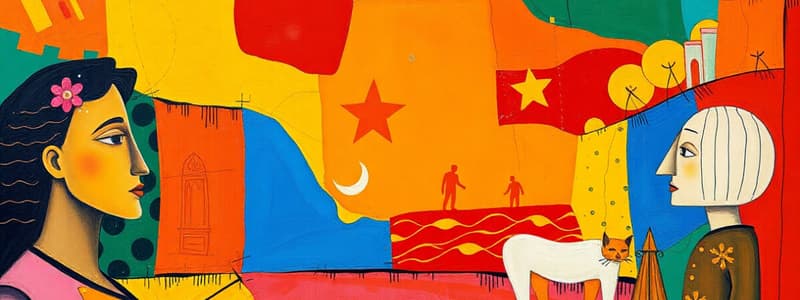Podcast
Questions and Answers
What is the longest river in the world?
What is the longest river in the world?
- Amazon River
- Nile River (correct)
- Mississippi River
- Yangtze River
Who is the artist known for creating the Mona Lisa?
Who is the artist known for creating the Mona Lisa?
- Leonardo da Vinci (correct)
- Vincent van Gogh
- Pablo Picasso
- Claude Monet
What is a key benefit of having broad general knowledge?
What is a key benefit of having broad general knowledge?
- Inability to analyze complex problems
- Enhanced and informed decision-making (correct)
- Reduction in communication skills
- Limited understanding of cultures
Which category includes significant global issues and political events?
Which category includes significant global issues and political events?
Which of the following tips is NOT recommended for expanding general knowledge?
Which of the following tips is NOT recommended for expanding general knowledge?
What role does critical thinking play in the importance of general knowledge?
What role does critical thinking play in the importance of general knowledge?
Which of these is classified under the Science category of general knowledge?
Which of these is classified under the Science category of general knowledge?
What is one effective way to maintain an open mind and curiosity in learning?
What is one effective way to maintain an open mind and curiosity in learning?
Flashcards are hidden until you start studying
Study Notes
General Knowledge Study Notes
Categories of General Knowledge
- History: Key events, dates, and figures; major wars and their impacts, civilizations, and cultural movements.
- Geography: Countries, capitals, major cities, notable landmarks, physical features (rivers, mountains).
- Science: Basic principles of biology, chemistry, physics; important discoveries and inventors.
- Technology: Key inventions, advancements in tech; notable figures in computing and engineering.
- Current Events: Recent news, significant global issues, and notable political events.
- Art and Literature: Famous authors and their works, movements in art (Renaissance, modernism), key artistic figures.
- Sports: Major sports, historical events (Olympics, World Cups), famous athletes.
- Culture: Traditions, languages, culinary practices, music genres from various regions.
Tips for Expanding General Knowledge
- Read Widely: Books, newspapers, and magazines on various topics.
- Engage with Media: Documentaries, educational podcasts, and news websites.
- Take Quizzes: Use trivia apps or quiz books to test and enhance knowledge.
- Attend Lectures & Workshops: Community events often feature knowledgeable speakers.
- Join Discussion Groups: Engage in conversations; sharing ideas enhances learning.
- Stay Curious: Explore new topics regularly and maintain an open mind.
Importance of General Knowledge
- Critical Thinking: Develops the ability to analyze and make informed decisions.
- Communication Skills: Enhances conversation ability and rapport with others.
- Problem Solving: Provides a broad base to draw from when tackling new challenges.
- Cultural Awareness: Deepens understanding of different perspectives and lifestyles.
Quick Facts
- The first known writing system: Cuneiform (ancient Mesopotamia).
- The longest river in the world: Nile River (approximately 4,135 miles).
- The largest planet in the Solar System: Jupiter.
- The artist behind the Mona Lisa: Leonardo da Vinci.
Use these notes to build a broader understanding of various subjects within general knowledge and consider ways to continually augment this knowledge base.
Categories of General Knowledge
- History: Covers significant events, dates, and influential figures from the past. It explores major wars and their lasting impact, delves into ancient and modern civilizations, and sheds light on cultural movements across different periods.
- Geography: Focuses on the Earth's surface, including countries, their capitals, notable cities, and iconic landmarks. It also examines physical features like rivers, mountains, and other geographical aspects.
- Science: Explores foundational principles in biology, chemistry, and physics. It highlights groundbreaking discoveries and inventors who have revolutionized our understanding of the natural world.
- Technology: Traces advancements in technological innovation, including key inventions and figures who have shaped the world of computing and engineering.
- Current Events: Keeps us informed about recent news, significant global issues, and notable political events shaping the world today.
- Art and Literature: Studies iconic authors and their influential works. It also delves into art movements like the Renaissance and modernism, celebrating key figures who have left a lasting impact on the artistic world.
- Sports: Examines major sports, significant historical events like the Olympics and FIFA World Cups, and renowned athletes who have captured the world's attention.
- Culture: Investigates traditions, languages, culinary practices, and music genres from diverse regions, fostering an understanding of cultural diversity.
Tips for Expanding General Knowledge
- Read widely: Explore books, newspapers, and magazines on a range of topics.
- Engage with media: Watch documentaries, listen to educational podcasts, and stay updated with news websites.
- Take quizzes: Utilize trivia apps or quiz books to test your knowledge and identify areas for improvement.
- Attend lectures and workshops: Community events often feature knowledgeable speakers sharing insights on various subjects.
- Join discussion groups: Engage in conversations, share your perspectives, and learn from others.
- Stay curious: Embrace a thirst for knowledge and continuously explore new and challenging topics.
Importance of General Knowledge
- Critical Thinking: Develops the ability to analyze information, evaluate evidence, and make informed decisions.
- Communication Skills: Enhances fluency in conversation, enabling effective communication and building stronger relationships.
- Problem Solving: Provides a broad foundation of knowledge to draw upon when tackling new and complex challenges.
- Cultural Awareness: Cultivates a deeper understanding of different perspectives, values, and lifestyles, fostering empathy and appreciation for diverse cultures.
Quick Facts
- The first known writing system: Cuneiform, developed in ancient Mesopotamia.
- The longest river in the world: The Nile River, stretching approximately 4,135 miles.
- The largest planet in the Solar System: Jupiter.
- The artist behind the Mona Lisa: Leonardo da Vinci.
Studying That Suits You
Use AI to generate personalized quizzes and flashcards to suit your learning preferences.




